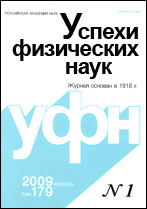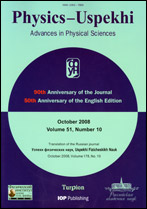|
300th anniversary of the Russian Academy of Sciences (RAS)
The most important achievements in studies of fundamental problems in nuclear physics over the past 25–30 years and their prospects
V. A. Matveevab
a Institute for Nuclear Research, Russian Academy of Sciences, Moscow
b Joint Institute for Nuclear Research, Dubna, Moscow region
Abstract:
This review is based on a report delivered on May 27, 2024 at the Scientific Session of the General Meeting of the Physical Sciences Division of the Russian Academy of Sciences, "Tricentennial of the Academy, Achievements of and Progress in Physical Sciences in the 21st Century." It covers the most important achievements in studying fundamental problems in nuclear physics over the past 25–30’years and prospects for further progress in this area. The report is focused on the contribution of Russian researchers to the global advancement that has occurred over recent decades in the study of fundamental problems in nuclear physics, including elementary particle physics and high-energy physics, relativistic nuclear physics and heavy ion physics, neutrino physics and neutrino astrophysics, and the physics of ultra-high-energy cosmic rays. Presented are the achievements of Russian scientists in theoretical physics and cosmology, which largely determine the successes in the exploration of the basic properties of matter. The contribution of Russian researchers to the implementation of major international projects, which has largely been a driver of their progress in recent decades, in particular, the discovery of the Higgs boson, is outlined. The current state and projects for the development of the research infrastructure of Russian research institutions are reviewed. The important role of progress in accelerator science and technology in exploring fundamental problems in nuclear physics is highlighted. Particular attention is paid to mega-science nuclear physics projects currently being developed and implemented in Russia and to emerging update of the strategy for the development of physical research and innovative technologies based on their results, which benefit the economy, education, and health care.
Received: September 30, 2024
Accepted: May 27, 2024
Citation:
V. A. Matveev, “The most important achievements in studies of fundamental problems in nuclear physics over the past 25–30 years and their prospects”, UFN, 194:12 (2024), 1250–1269
Linking options:
https://www.mathnet.ru/eng/ufn15979 https://www.mathnet.ru/eng/ufn/v194/i12/p1250
|


| Statistics & downloads: |
| Abstract page: | 1 | | References: | 3 | | First page: | 1 |
|





 Contact us:
Contact us: Terms of Use
Terms of Use
 Registration to the website
Registration to the website Logotypes
Logotypes








 Citation in format
Citation in format 
